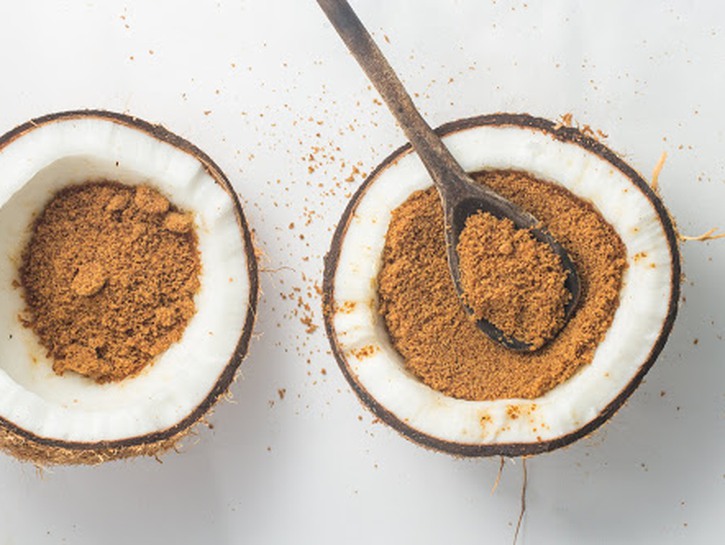As sugar detoxes and low-sugar living gain traction in the healthy lifestyle community, it’s only natural to search for a healthier form of sweetener. Coconut sugar has been touted as the next big thing for health-conscious eaters as a sugar substitute that’s actually good for you. We’re here to break this sweet substance down, explore some of the health claims associated with it, and figure out how it stacks up to normal table sugar. Read on for our guide to all things coconut sugar.

So What Is Coconut Sugar?
Before we can begin to discuss its potential health benefits, we first must understand what exactly this sugar is. Coconut sugar, sometimes called coconut palm sugar, comes from the sap of a coconut tree. That syrupy liquid is collected and heated so the majority of the water content evaporates. The end result is brown and granulated, similar to normal raw sugar. Pro tip: be careful not to confuse coconut palm sugar with general palm sugar, a staple of Thai cuisine. Despite their similar names, they are very different sweeteners.

Reported Benefits
Supporters of coconut sugar claim a multitude of advantageous effects of its consumption, especially when compared to regular old table sugar. Let’s break down a few of the most popular claims.
#1: More Nutritious
Regular sugar contains no redeeming qualities and is essentially consuming empty calories with zero nutritional value. On the other hand, coconut sugar does in fact contain various nutrients and minerals such as calcium, potassium, iron, and zinc, plus antioxidants. However, they are present in such small quantities that in order to reap the benefits you’d have to consume far too much sugar. Therefore, these trace minerals are not actually a positive, and coconut sugar cannot truly be considered a more nutritious option.

#2: More Natural
Another claim associated with coconut sugar is that it is more natural than table sugar. This is actually true because coconut sugar is less processed. Still, make sure to check the ingredients list if you buy coconut sugar; ideally, the only thing listed will be evaporated coconut palm nectar. This means that your coconut sugar hasn’t been modified since it was heated to encourage evaporation into a solid from the original syrup form. As always, it’s best to purchase organic, non-GMO coconut sugar to ensure it’s as natural as possible.
#3: Coconut Connection
It’s easy to assume that because coconuts are healthy for us, that coconut sugar as an extension would be as well. Unfortunately that is simply not the case. As previously discussed, coconut sugar is not derived from the coconut itself but rather from the sap. So all the well-known goodness of coconuts, such as containing healthy fat, do not apply to the sugar.

#4: Lower Glycemic Index (GI)
By far the most repeated claim about coconut sugar is that it is lower on the GI than table sugar. This is true, as sugar measures 60 on the glycemic index while coconut sugar measures 54. It is important to note that this could vary between batches of sugar and is also dependent on how its processed. Additionally, coconut sugar contains inulin, which may help to slow glycemic absorption. However, the infinitesimal health benefits of a barely lower glycemic index are nothing to get excited about. We’ve found this health claim to be irrelevant.
Substitutions
It’s clear that coconut sugar is not all it’s cracked up to be, so we thought it would be wise to review some healthier sweetening options for you. One popular option is Stevia, which is sweet extract from a South American plant. It’s far sweeter than sugar and doesn’t affect blood glucose. Another great option is called xylitol — it comes from birch trees and boasts zero fructose content. Just remember: it’s best not to use sweeteners at all, but if you are going to, do your research and try to find healthier substitutions.

So overall, we’ve discussed what coconut sugar is and found out it is in fact more natural than table sugar. Unfortunately it’s not a good source of nutrients, doesn’t have any of the healthy goodness of actual coconuts, and has negligible benefits from its lower glycemic index. After all, sugar is still sugar and there’s no miracle healthy way to sweeten our foods. It’s best to cut down on sugar in any form. However, in moderation, coconut sugar is an viable option for use as a sweetener, just don’t pretend it’s actually healthy.
